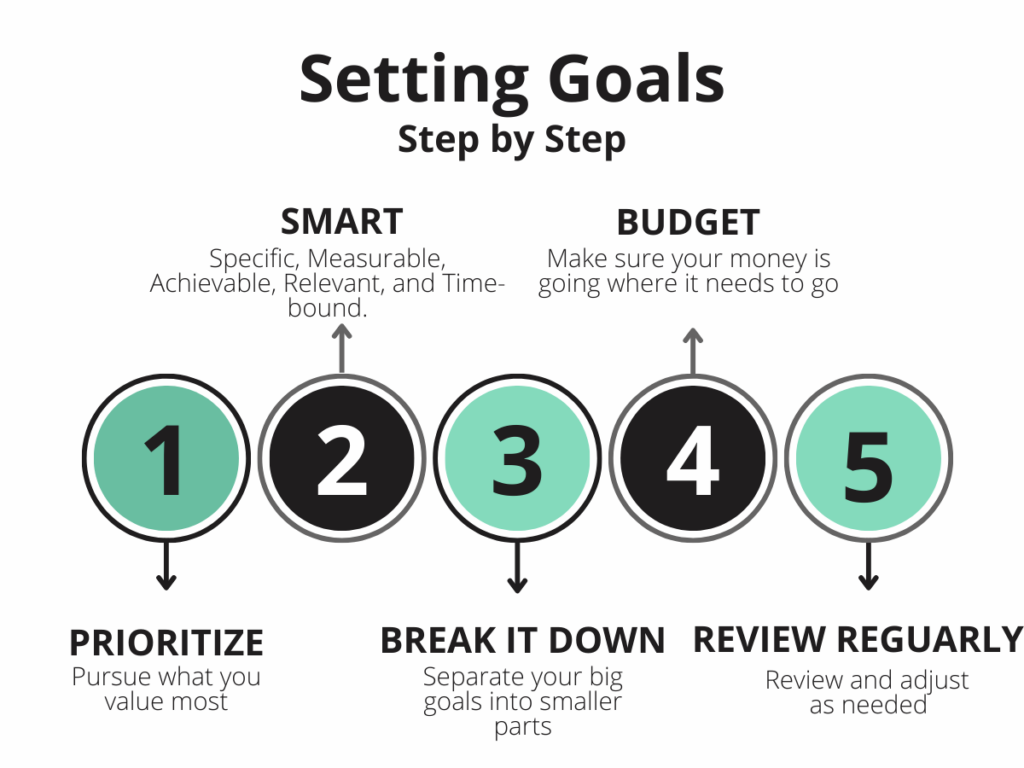Let’s face it – we millennials have unique financial challenges. From student loan debt to an ever-evolving job market, the pressure is real. It’s a lot. However, you can navigate these increasing challenges. Setting financial goals can be your financial North Star.
Let’s explore how to establish your short-term and long-term financial goals and why they are essential for a secure future. Plus, we’ll dive into some reasonable financial goals examples.
Know Your Goals
First, let’s differentiate between short-term and long-term goals. Short-term financial goals are objectives you can achieve within a few years, such as saving for a vacation or paying off credit card debt. Long-term financial goals, however, require more time (often more than five years) and usually involve more money and planning, like retirement or buying a house.
Setting Financial Goals – Step by Step:
The process of setting financial goals is not just crucial but empowering. Here’s a step-by-step guide:

- Reflect and Prioritize: Reflect on what you value the most. Is it traveling, owning a house, or a comfortable retirement? Prioritize your goals.
- Set SMART Goals: Ensure your goals are Specific, Measurable, Achievable, Relevant, and Time-bound.
- Break It Down: Break your long-term financial goals into sub-goals. It will make them more manageable and less daunting.
- Make a Budget: Know where your money is going. Create a budget that accommodates your financial goals.
- Regularly Review: Life is unpredictable. Regularly review your goals and make necessary adjustments.
Short-Term Financial Goal Examples
A short-term financial goal might include saving for something that is a few months to a few years away.
- Build an Emergency Fund: Aim to save 3-6 months’ living expenses. This fund acts as a safety net in case of unexpected events.
- Pay Off Credit Card Debt: Focus on paying off high-interest debt to avoid the burden of accumulating interest.
- Save for a Vacation: Traveling is liberating but potentially expensive. Start a vacation fund.
- Pursue a Hobby or Skill: Invest in personal development. New skills could also lead to new career opportunities.
Matching your short-term goals with short-term investments can be an excellent way to increase the likelihood of meeting your goals.
Examples of Financial Goals for the Long Term
- Purchase a Home: Owning property is a classic long-term financial goal. Start by saving for a down payment.
- Save for Retirement: Begin early by contributing to a 401(k) or IRA. Compound interest is your friend.
- Pay Off Student Loans: It’s a marathon for most. Develop a strategy to chip away at this debt without sacrificing other financial goals.
- Invest in the Capital Markets: Develop a diversified investment portfolio. It can provide passive income and financial security. After establishing a solid financial foundation, you can begin investing to build alternative income sources.
- Financial Independence and Financial Freedom: Getting to the point where you’re living off your assets and not relying on your day job to meet your basic needs. The ultimate dream, right?
Good Financial Goals That Elevate Your Finances
- Improve Your Credit Score: A good credit score can open doors to better loan interest rates. Some employers even check it when deciding on potential hires.
- Negotiate Salary: Don’t underestimate your worth. Regularly negotiate your salary or seek new job opportunities that offer better compensation. Job hopping advances your career, contrary to what boomers tell you.
- Network and Build Relationships: Establish connections with people in your industry. Networking is an investment in your career and can lead to better opportunities.
- Live Below Your Means: Avoid lifestyle inflation. Save and invest the extra income. Keeping lifestyle creep in check is one of the most powerful ways to ensure financial success.
- Be Insured: Protect yourself from financial shocks by getting the right insurance. An adverse financial shock can be catastrophic, even for the financially successful. Make sure you have enough of the right coverage to prevent financial ruin.
- Learn Financial Literacy: Knowledge is power. As the saying goes, “the only constant is chance.” So, stay informed about financial planning, investment, and market trends.
Financial Goals are Important
Setting financial goals is the cornerstone of financial success, especially for us millennials. From short-term financial goal examples like building an emergency fund to long-term financial goal examples such as saving for retirement, it’s imperative to know what you are working towards. Remember, a goal without a plan is just a wish. Be proactive, make a plan, and take control of your financial future.
Consistency and Discipline
As millennials, our lives can be fast-paced and filled with distractions. Staying consistent and disciplined in your approach to achieving your financial goals is crucial. Automate your savings and investments so that a portion of your income goes directly towards your goals without you having to think about it. This not only ensures that your financial goals are on track, but it also removes the temptation to spend the money impulsively.
Seek Professional Help if Needed
There is no shame in seeking help. If you need help to plan or stay on track, consider speaking with a financial advisor. They can offer valuable insights and advice tailored to your specific situation. Remember, investing in sound financial advice can pay dividends in the long term.
Don’t Be Too Hard on Yourself
It’s important to realize that the road to achieving financial goals is not always smooth. There may be setbacks, but that’s okay. Don’t be too hard on yourself. Celebrate small victories and stay focused on the bigger picture. Your future self will thank you.
Create a Balance
While it’s important to have discipline with saving and investing, creating a balance is also essential. Allow yourself to enjoy the present but within reason. Create a budget that accommodates both your present wants and your future goals.
Parting Words
It’s no secret that millennials face more economic challenges than previous generations. These challenges make setting financial goals within a financial plan a necessity. With the right combination of short-term and long-term financial goals, you can create a financially secure and fulfilling life.
Remember the solid financial goals mentioned above, and remember to break your goals into manageable chunks. Reflect regularly, and be willing to adapt as life changes. A good, independent financial advisor can help you where and when you need it.
The journey of a thousand miles begins with a single step. Take that step by setting your financial goals and working toward them relentlessly.
Remember, the best investment you can make is in yourself. Equip yourself with the knowledge, tools, and determination to achieve your goals.

